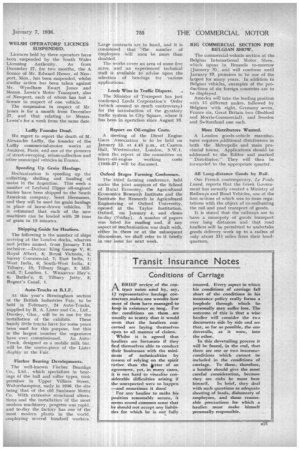Transit Insurance Notes
Page 5

If you've noticed an error in this article please click here to report it so we can fix it.
Conditions of Carriage PA.A BRIEF review of the contract notes used by, say, 12 representative haulage contractors makes one wonder how most of them have managed to keep in existence so. long. For the conditions on them are usually so scanty that it would seem that the hauliers concerned are laying themselves open to all manner of claims.
Whilst it is agreed that hauliers are fortunate if they find themselves able to conduct their businesses with the minimum of technicalities by reason of relying on the spirit rather than the if tter of an agreement, yet, in many cases, it is not hard to visualise considerable difficulties arising if the unexpected were to happen —and sometimes it does!
For any haulier to make his position reasonably secure, it seems sound common sense that he should not accept any liabilities for which he is not fully
insured. Every aspect in whicti his conditions of carriage fall short of the conditions in his insurance policy really forms a loophole through which he personally may suffer loss. The outcome of this is that a wise haulier will consider the two documents side by side and see that, so far as possible, the one dovetails, as it were, into the other.
In this dovetailing process it will be found, in the end, that there are one or two insurance conditions which cannot be included in the conditions of carriage. To these, therefore, a haulier should give the most careful consideration, because they are risks he must bear
himself. In brief, they deal with such questions as adequate sheeting of loads, dishonesty of employees, and those reasonable precautions for which a haulier must make himself personally responsible.
































